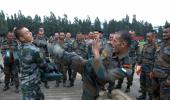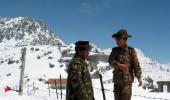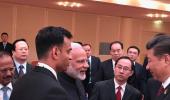'War cannot resolve problems. So wisdom is to resolve diplomatically.'

The border standoff with China cannot be resolved through war, but bilateral talks, the government told Parliament on Thursday, August 3.
India, External Affairs Minister Sushma Swaraj told the Rajya Sabha, is engaged with China to resolve differences, not only on the standoff on the Doklam Plateau, but other matters like the border dispute, India's membership of the Nuclear Suppliers Group and China's blocking of United Nations sanctions against Jaish-e-Mohammad terrorist Masood Azhar.
"Patience and control on comments are key to resolving problems. We are maintaining patience and controlling comments," Swaraj said, replying to a discussion on 'India's foreign policy and engagement with strategic partners'.
The minister read out a statement explaining India's position on the Doklam standoff, which has been going on for over a month.
"War is not a solution to anything. Even after war, there has to be a dialogue. So, have dialogue without a war... Patience, control on comments and diplomacy can resolve problems," the minister said.
If patience is lost, the minister said there can be provocation on the other side.
"We will keep patience to resolve the issue," Swaraj said, adding "We will keep engaging with China to resolve the dispute."
In response to questions, she said military readiness is always there as the military is meant to fight wars.
"But war cannot resolve problems. So wisdom is to resolve diplomatically," the minister asserted, expressing confidence that the issue could be resolved through bilateral talks.
Swaraj also lashed out at the Congress and its leadership for meeting the Chinese ambassador over the border standoff.
"You (the Congress) should have first sought details from the governnment and then confronted the Chinese envoy," she said, referring to Congress MP Rahul Gandhi's meeting with the Chinese ambassador.
The minister said she had met leaders of all parties over two days to explain the Doklam issue. The leaders, she added, left after being fully convinced of the government stand.
She also slammed the Congress for questioning why India had boycotted China's 'One Belt, One Road' conference.
"Do you know through where the OBOR passes? And you are asking these questions? It is a matter of national sentiment. You are the main Opposition party, You should speak with responsibility," Swaraj said, referring to the project which China proposes to build through Pakistan occupied Kashmir.
At this, Congress MP Anand Sharma said the remarks made by his party colleague Rajeev Shukla regarding the OBOR were in his "individual" capacity.
Swaraj then took a dig at the Congress, asking when the party had become so democratic that each member speaks in his own voice.
Earlier, Sharma accused the government of mishandling foreign relations, particularly in the context of tensions with China.
China, Sharma said, is being "unusually aggressive" and the "doors of diplomacy seem to be closing".
"When it comes to the country's national interests, we stand as one and there is no division. It is clear...Diplomacy must be given a chance. We believe in making all possible diplomatic channels to de-escalate the situation on the borders," Sharma, a former Union minister, said.
"De-escalation does not mean retreat. It is safeguarding India's interest," he said.
Targeting Prime Minister Narendra Modi, Sharma said he had "not uttered a word" on what he had discussed with Chinese President Xi Jinping during their meetings in Astana, Kazakhstan, and Hamburg, Germany.
"It is his duty to tell us. He cannot remain silent on matters of India's sensitive interests," Sharma said.
National Security Adviser Ajit Doval, Sharma noted, had visited China last week and wondered if after the NSA's visit "a window has opened that this standoff would be resolved."
The Congress MP felt it is a matter of concern that China has offered to mediate between India and Pakistan.
Managing the periphery comes first, he said, and that is of critical importance, saying the rest comes later.
"Unless we manage our neighbours correctly, it would be difficult or rather impossible to play a major role globally," Sharma said, adding, "What is your roadmap? There is no stability in your policy. It keeps changing. First you say we would talk and then stop talks."
India, he said, had succeeded in de-hyphenating India from Pakistan. "The real concern is that the hyphenation is back," he added.
"We have concern because China's profile in Pakistan is increasing and Pakistan is getting emboldened of this support from China and that is our concern," he said.
Samajwadi Party MP Professor Ram Gopal Yadav expressed concern that Russia's affinity towards India is diminishing.
In such a scenario, Professor Yadav said India has to identify which country could be a reliable friend during a crisis.
India has been reduced to being a junior strategic ally of the United States, Communist Party of India-Marxist MP Sitaram Yechury said.
According to information available on a US Web site, in the agreement on logistics signed during Narendra Modi's visit to the US last year, Yechury said India's status has been shown as a 'junior partner' to advance US interests in defence and security in South Asia, which the CPI-M MP termed as the "last nail in our independent foreign policy."
Russia, a friend of India earlier, Yechury pointed out, had concluded a pact with Pakistan while India was conducting a joint military exercise with the US and Japan in the Bay of Bengal.










